-
Neueste Beiträge
Neueste Kommentare
- Jazzybee bei Geheimnisse einer Kaiserin
- Heinz Ludwig ErnstH bei Geheimnisse einer Kaiserin
- dinozeros bei Der Idiot
- Gudrun Philipp bei Der Winterkrieg – Finnland 1939/1940
- Thomas Wrage bei Der Winterkrieg – Finnland 1939/1940
Meta
Archive
- Juni 2024
- Mai 2024
- April 2024
- März 2024
- Februar 2024
- Januar 2024
- Dezember 2023
- November 2023
- Oktober 2023
- September 2023
- August 2023
- Juli 2023
- Juni 2023
- Mai 2023
- April 2023
- März 2023
- Februar 2023
- Januar 2023
- Dezember 2022
- November 2022
- Oktober 2022
- August 2022
- Juli 2022
- Juni 2022
- Mai 2022
- April 2022
- März 2022
- Februar 2022
- Januar 2022
- Dezember 2021
- November 2021
- Oktober 2021
- September 2021
- August 2021
- Juli 2021
- Juni 2021
- Mai 2021
- April 2021
- März 2021
- Februar 2021
- Januar 2021
- Dezember 2020
- November 2020
- Oktober 2020
- September 2020
- August 2020
- Juli 2020
- Juni 2020
- Mai 2020
- April 2020
- März 2020
- Februar 2020
- Januar 2020
- Dezember 2019
- November 2019
- Oktober 2019
- September 2019
- August 2019
- Juli 2019
- Juni 2019
- Mai 2019
- April 2019
- März 2019
- Februar 2019
- Januar 2019
- Dezember 2018
- November 2018
- Oktober 2018
- September 2018
- August 2018
- Juli 2018
- Juni 2018
- Mai 2018
- April 2018
- März 2018
- Februar 2018
- Januar 2018
- Dezember 2017
- November 2017
- Oktober 2017
- September 2017
- August 2017
- Juli 2017
- Juni 2017
- Mai 2017
- April 2017
- März 2017
- Januar 2017
- Dezember 2016
- November 2016
- Oktober 2016
- Juni 2016
- November 2011
Kategorien
- American History (English) (291)
- Alaska (1)
- American Revolution (3)
- California (27)
- Civil War (21)
- Connecticut (6)
- District of Columbia (9)
- Florida (4)
- Georgia (4)
- Historic Highways (12)
- Historical Travelogues (16)
- Illinois (9)
- Indiana (2)
- Maryland (6)
- Massachusetts (24)
- Michigan (7)
- Minnesota (1)
- Missouri (4)
- New Jersey (3)
- New York (25)
- North Carolina (3)
- Ohio (4)
- Oregon (1)
- Pennsylvania (9)
- Tennessee (1)
- Texas (16)
- The Presidents (49)
- Utah (2)
- Washington (3)
- Wisconsin (5)
- Ancient History (English) (13)
- Antike Philosophie (3)
- Astrologie (1)
- Biographies (English) (48)
- Chinesische Philosophie (3)
- Christmas (English) (18)
- Classics of Fiction (English) (663)
- Alcott, Louisa May (29)
- Austen, Jane (11)
- Barrie, James M. (14)
- Baum, L. Frank (17)
- Carroll, Lewis (7)
- Cather, Willa (4)
- Chesterton, G. K. (37)
- Chopin, Kate (4)
- Coleridge, Samuel Taylor (11)
- Collins, Wilkie (39)
- Dickens, Charles (20)
- Doyle, Arthur Conan (46)
- Eliot, George (14)
- Frederic, Harold (12)
- Frost, Robert (1)
- Gibran, Khalil (0)
- Goethe, Johann Wolfgang von (2)
- Hardy, Thomas (11)
- Hawthorne, Nathaniel (3)
- Hedin, Sven (6)
- Hodgson-Burnett, Frances (25)
- Hoffmann, E.T.A. (1)
- Hope, Anthony (31)
- Howells, William Dean (72)
- Hugo, Victor (25)
- Irving, Washington (12)
- Kneipp, Sebastian (2)
- Lang, Andrew (31)
- Longfellow, Henry Wadsworth (1)
- Melville, Herman (9)
- Montgomery, Lucy Maud (15)
- Scott, Sir Walter (8)
- Shelley, Mary Wollstonecraft (8)
- Stevenson, Robert Louis (34)
- Stories For Sleepless Nights (1)
- Stratton-Porter, Gene (16)
- Thoreau, Henry David (1)
- Toomer, Jean (2)
- Twain, Mark (33)
- Verne, Jules (6)
- Webster, Jean (8)
- Wells, H.G. (9)
- Wharton, Edith (1)
- Wollstonecraft, Mary (7)
- Culture, Sports & Entertainment (English) (1)
- Deutscher Novellenschatz (24)
- Deutschland unter Kaiser Wilhelm II. (8)
- Die Geschichte des Eisens (10)
- Die Schriften der Kirchenväter (104)
- Die verlorenen Bücher der Bibel (30)
- Elisabeth von Österreich – Die Kollektion (4)
- European History (English) (18)
- Fairy Tales and Mythology (English) (3)
- Kinderbücher (15)
- Krimis aus der goldenen Zeit (10)
- Lateinische Klassiker (10)
- Ammianus Marcellinus (1)
- Apuleius (2)
- Boethius (1)
- Catullus (1)
- Celsus (1)
- Cicero (2)
- Julius Caesar (2)
- Märchen & Sagen (13)
- Mathematik Zahlentrainer (38)
- Meisterwerke der Literatur (1.050)
- A (29)
- Achleitner-Arthur (0)
- Adler, Emma (1)
- Adlersfeld-Eufemia von (1)
- Aho-Juhani (0)
- Alcott, Louisa May (4)
- Alexis-Willibald (0)
- Alighieri-Dante (2)
- Allen-James (1)
- Altenberg-Peter (3)
- Andersen-Hans Christian (1)
- Andrejew-Leonid (1)
- Anzengruber-Ludwig (6)
- Arbiter-Gaius Petronius (1)
- Aretz-Gertrude (1)
- Aristophanes (1)
- Aristoteles (1)
- Arndt-Ernst Moritz (0)
- Arnim – Achim von (1)
- Arnim-Bettina von (0)
- Äsop (1)
- Auerbach-Berthold (1)
- Augustinus-Aurelius (1)
- Aurel-Marc (1)
- B (70)
- Bacon, Francis (1)
- Bahr-Hermann (10)
- Ball, Hugo (1)
- Balzac-Honoré de (4)
- Barbusse-Henri (1)
- Bassewitz-Gerd von (1)
- Baudelaire-Charles (1)
- Bauer, Karoline (1)
- Bauer-Otto (0)
- Baum-L. Frank (2)
- Bebel-August (0)
- Bechstein, Ludwig (1)
- Beck-Jürgen (2)
- Beecher-Stowe-Harriet (1)
- Benjamin-Walter (0)
- Berend-Alice (0)
- Bernhardi-Sophie (0)
- Bettauer-Hugo (2)
- Birt – Theodor (0)
- Bismarck-Otto von (1)
- Bjornson-Bjornstjerne (0)
- Blei-Franz (0)
- Bleibtreu-Karl (4)
- Boccaccio-Giovanni (1)
- Böhlau-Helene (0)
- Bote-Hermann (1)
- Boy Ed, Ida (8)
- Boyer-Jean Baptiste (1)
- Braun-Lily (0)
- Brentano-Clemens (8)
- Bronté-Charlotte (1)
- Bruun-Laurids (0)
- Büchner-Georg (2)
- Büchner-Luise (1)
- Bulwer-Lytton-Edward (1)
- Bunyan, John (3)
- Burckhardt-Jacob (0)
- Bürger-Gottfried August (1)
- Burnett-Frances Hodgson (1)
- Busch-Wilhelm (7)
- Byron-George (0)
- C (32)
- Carroll-Lewis (1)
- Carus-Carl Gustav (0)
- Chaucer-Geoffrey (1)
- Chesterton-Gilbert Keith (1)
- Choderlos-P.A. de Laclos (1)
- Christ-Lena (5)
- Cicero (2)
- Claudius-Matthias (1)
- Clausewitz-Carl von (1)
- Colerus-Egmont (3)
- Collins-Wilkie (2)
- Collodi-Carlo (1)
- Connell-Richard (1)
- Conrad-Joseph (3)
- Conrad-Michael Georg (1)
- Conwell-Russell (1)
- Cooper-James-Fenimore (5)
- Corvin-Otto von (1)
- Couperus-Louis (0)
- Crusenstolpe-Magnus Jacob (1)
- D (73)
- Dahn-Felix (0)
- Darwin-Charles (1)
- Daudet-Alphonse (10)
- Daumer-Georg Friedrich (1)
- Dauthendey-Max (8)
- Defoe-Daniel (3)
- Delbrück-Hans (0)
- Dickens-Charles (13)
- Diderot-Denis (3)
- Dohm-Hedwig (4)
- Dostojewski-Fjodor (8)
- Doyle-Arthur-Conan (5)
- Drews-Arthur (1)
- Droste-Hülshoff-Annette (2)
- Droysen-Johann Gustav (1)
- Dumas-Alexandre (9)
- Duncker-Dora (4)
- E (43)
- Ebers-Georg (4)
- Ebner-Eschenbach-Marie (0)
- Eckstein-Ernst (1)
- Eichendorff-Joseph von (2)
- Elvestad-Sven (8)
- Emmerich-Ferdinand (7)
- Engel-Georg (4)
- Engels-Friedrich (1)
- Ernst-Otto (0)
- Ernst-Paul (0)
- Ertl-Emil (0)
- Eschenbach-Wolfram von (1)
- Eschstruth-Nataly von (9)
- Essig-Hermann (3)
- Eucken-Rudolf (0)
- Eulenburg-Philipp zu (1)
- Euripides (1)
- Eyth-Max (1)
- F (73)
- Faber-Kurt (5)
- Falke-Gustav (6)
- Federer-Heinrich (4)
- Felder-Franz Michael (1)
- Feuerbach-Ludwig (1)
- Fichte-Johann Gottlieb (0)
- Fielding-Henry (2)
- Flammarion-Camille (1)
- Flaubert-Gustave (1)
- Fletcher-Joseph Smith (5)
- Fock-Gorch (2)
- Fontane-Theodor (15)
- Forster-Georg (1)
- Fouqué-Friedrich-de-Motte (0)
- Frankau, Julia (1)
- Franklin-Benjamin (1)
- Franzos-Karl Emil (8)
- Frapan, Ilse (2)
- Freud-Sigmund (5)
- Freytag-Gustav (7)
- Friedell-Egon (4)
- G (72)
- Gaboriau-Emile (1)
- Galen-Philipp (1)
- Ganghofer-Ludwig (15)
- Garschin-Wsewolod (1)
- Gellert-Christian Fürch. (1)
- George-Stefan (1)
- Gerhardt-Paul (1)
- Gerstäcker-Friedrich (3)
- Gibbon-Edward (1)
- Gilman-Charlotte-Perkins (1)
- Gjellerup-Karl Adolph (5)
- Glauser-Friedrich (7)
- Goethe-Johann W. von (6)
- Gogol-Nikolai (3)
- Goldoni-Carlo (1)
- Gontscharow-Iwan (1)
- Gorki-Maxim (4)
- Gotthelf-Jeremias (6)
- Gregorovius-Ferdinand (1)
- Grimmelshausen-Hans Jakob (1)
- Günther-Agnes (1)
- Gutzkow-Karl (10)
- H (66)
- Hahn-Hahn-Ida Gräfin (5)
- Hansjakob-Heinrich (3)
- Hasek-Jaroslav (1)
- Hauff-Wilhelm (5)
- Hebel-Johann Peter (2)
- Hedin, Sven (2)
- Heer-Jakob Christoph (7)
- Hegel-Georg Wilhelm (4)
- Heiberg-Hermann (5)
- Heine-Heinrich (2)
- Herder-Johann Gottfried (1)
- Herodot (1)
- Hillern-Wilhelmine von (1)
- Hindenburg-Paul von (1)
- Hoffmann-Andreas Gottlieb (1)
- Hoffmann-E.T.A. (7)
- Hofmannsthal-Hugo von (7)
- Hölderlin-Friedrich (2)
- Holub-Emil (1)
- Homer (2)
- Horvath-Ödön von (1)
- Hugo-Victor (2)
- Huysmans-Joris Karl (1)
- I (10)
- Ibsen-Henrik (7)
- Irving-Washington (3)
- J (6)
- Jensen-Wilhelm (6)
- K (61)
- Kafka-Franz (3)
- Kant-Immanuel (2)
- Katharina-die-Große (1)
- Keats-John (1)
- Keller-Gottfried (4)
- Keller-Paul (7)
- Kempen-Thomas von (1)
- Keyserling-Eduard von (6)
- Kierkegaard-Sören (3)
- Kipling-Rudyard (4)
- Klabund (1)
- Kleist-Heinrich von (2)
- Klingemann-August (1)
- Klinger-Friedrich Maximilian (1)
- Klopstock-Friedrich Gottlieb (1)
- Kneipp, Sebastian (2)
- Knigge-Adolf Freiherr von (1)
- Koch-Rosalie (1)
- Korolenko-Wladimir (1)
- Kotzebue, August von (1)
- Kraft-Robert (5)
- Kraus-Karl (4)
- Kropotkin, Pjotr (0)
- Kropotkin-Pjotr (2)
- Kugler-Franz (1)
- Kurz-Hermann (3)
- Kyber-Manfred (2)
- L (45)
- La Roche-Sophie von (1)
- Lafontaine-Jean de (1)
- Lagerlöf-Selma (4)
- Landsberger-Artur (7)
- Laßwitz-Kurd (1)
- Laube-Heinrich (6)
- Lermontow-Michail (1)
- Lessing-Gotthold Ephraim (3)
- Lichtenberg-Georg Christoph (1)
- Lienhard-Friedrich (4)
- Lindau-Paul (1)
- Lofting-Hugh (2)
- Löns-Hermann (2)
- Loti-Pierre (2)
- Lovecraft, H. P. (3)
- Ludwig-Otto (3)
- Luther-Martin (3)
- M (105)
- Macaulay-Thomas B. (2)
- MacDonald-George (1)
- Machiavelli-Niccolo (2)
- Mackay-John Henry (6)
- Mann, Heinrich (10)
- Manzoni-Alessandro (1)
- Marlitt-Eugenie (9)
- Marx-Karl (2)
- Maupassant-Guy de (1)
- Mauthner-Fritz (0)
- May-Karl (37)
- Meding-Oskar (9)
- Mereschkowski-Dmitri (1)
- Meyer-Eduard (0)
- Meyrink-Gustav (1)
- Milton-John (1)
- Molière (4)
- Mommsen-Theodor (6)
- Montaigne-Michel de (1)
- Morgenstern-Christian (1)
- Mörike-Eduard (3)
- Moritz-Karl Philipp (1)
- Morus-Thomas (1)
- Moszkowski-Alexander (2)
- Mühsam-Erich (1)
- Multatuli (1)
- Muther-Richard (1)
- N (13)
- Nestroy-Johann (2)
- Niese-Charlotte (4)
- Nietzsche-Friedrich (5)
- Northup-Solomon (1)
- Novalis (1)
- O (14)
- Ohnet-Georges (9)
- Ossietzky-Carl von (0)
- Otto-Louise (4)
- Ovid (1)
- P (21)
- Panizza-Oskar (3)
- Petrarca-Francesco (1)
- Pfalz-Liselotte von der (1)
- Philon (0)
- Platon (5)
- Poe-Edgar Allan (1)
- Potapenko-Ignatji (1)
- Prévost-Marcel (5)
- Puschkin-Alexander (2)
- Pyle, Ernie (2)
- R (41)
- Rabelais-Francois (1)
- Rellstab-Ludwig (2)
- Retcliffe-Sir John (2)
- Reymont-Wladyslaw (1)
- Rhoden-Emmy von (1)
- Richthofen-Manfred von (1)
- Rilke-Rainer Maria (2)
- Ringelnatz-Joachim (2)
- Rohlfs-Gerhard (1)
- Rolfes, Eugen (1)
- Rosegger-Peter (11)
- Rosen-Erwin (1)
- Rostand-Edmond (2)
- Roth-Joseph (8)
- Rousseau-Jean Jacques (3)
- Rückert-Friedrich (2)
- S (102)
- Sade-Marquis de (1)
- Saint Exupéry, Antoine de (1)
- Salgari-Emilio (1)
- Sapper-Agnes (1)
- Scheerbart-Paul (10)
- Schickele-René (4)
- Schiller-Friedrich (11)
- Schlegel-Friedrich (1)
- Schlenther-Paul (1)
- Schnitzler-Arthur (2)
- Schopenhauer-Arthur (3)
- Schreckenbach-Paul (2)
- Schröder-Devrient-Wilhelmine (1)
- Schubin, Ossip (1)
- Schurig-Arthur (1)
- Schwab-Gustav (0)
- Scott-Sir Walter (1)
- Semjonow-Sergej (1)
- Seneca-Lucius Annaeus (0)
- Seume-Johann Gottfried (1)
- Shakespeare-William (16)
- Shelley-Mary Wollstonecraft (1)
- Sienkiewicz-Henryk (1)
- Silesius-Angelus (1)
- Simmel-Georg (0)
- Simrock-Karl (2)
- Sonnleitner-Alois Theodor (3)
- Sophokles (5)
- Spengler-Oswald (2)
- Spindler-Karl (3)
- Spinoza-Baruch de (2)
- Sprenger-Jakob (1)
- Spyri-Johanna (0)
- Stael-Germaine de (1)
- Steiner-Rudolf (2)
- Stendhal (3)
- Sterne-Laurence (1)
- Stevenson-Robert Louis (1)
- Stifter-Adalbert (1)
- Stoker-Bram (1)
- Storm-Theodor (5)
- Straßburg-Gottfried von (1)
- Stucken-Eduard (2)
- Suttner-Bertha von (2)
- Swift-Jonathan (1)
- T (38)
- Tagore-Rabindranath (1)
- Thoma-Ludwig (5)
- Thoreau-Henry David (1)
- Tieck-Ludwig (1)
- Tolstoi-Leo (11)
- Treller-Franz (1)
- Tschechow-Anton (6)
- Tucholsky-Kurt (3)
- Turgenew-Ivan (2)
- Twain-Mark (7)
- U (10)
- Ungar-Hermann (0)
- Ury-Else (10)
- V (28)
- Verne-Jules (26)
- Voltaire (1)
- W (63)
- Wagner-Richard (1)
- Wallace-Edgar (46)
- Wallace-Lewis (1)
- Walpole-Horace (1)
- Wassermann-Jakob (2)
- Weber-Max (0)
- Wells-H. G. (2)
- Whitman-Walt (1)
- Wilde-Oscar (5)
- Wolzogen-Caroline von (1)
- Wörishöffer-Sophie (1)
- Wundt-Wilhelm (1)
- Wyss-Johann David (1)
- Y (1)
- Young, Filson (1)
- Z (30)
- Zola-Emile (18)
- Zweig-Stefan (11)
- A (29)
- Middle East History (English) (20)
- Mind Power (English) (30)
- Opern der Welt (11)
- Philosophie (4)
- Philosophy & Politics (English) (151)
- 17th Century (1)
- 18th Century (49)
- 19th Century (61)
- 20th Century (2)
- Ancient (24)
- Middle Ages (2)
- Renaissance (14)
- Poetik (4)
- Recht (4)
- Religionen der Welt (92)
- Calvin, Johannes (17)
- Sachbücher (30)
- Sam Caine (Krimiserie) (5)
- Schlachten des II. Weltkriegs (45)
- Science (English) (1)
- 19th Century (1)
- Sport (0)
- The Sacred Books (English) (298)
- Astrology (2)
- Biblical Reference (3)
- Biblical Studies & Commentaries (61)
- Buddhism (27)
- Children's Great Bible Texts (8)
- Christology (18)
- Church History (63)
- Divination (4)
- Ethnic & Tribal (6)
- Freemasonry (18)
- Gnosticism (3)
- Judaism (3)
- Life of Jesus (2)
- Mariology (4)
- Mysticism (33)
- Occultism (22)
- Prayers & Sermons (3)
- Protestant (1)
- Spirituality (16)
- The Sacred Writings (33)
- Theosophy (3)
- Yoga (13)
- Weihnachten (11)
- Weltgeschichte (14)
- 18. Jahrhundert (1)
- 19. Jahrhundert (9)
- Altertum (0)
- I. Weltkrieg (3)
- II. Weltkrieg (1)
- World History (English) (17)
- American History (English) (291)
Archiv der Kategorie: Chesterton, G. K.
What I saw in America
What I saw in America – Gilbert Keith Chesterton
Americans like to read the opinions of other people from other lands about them, and particularly will they delight in this volume by G. K. Chesterton. There is a rich vein of humor in all of Chesterton’s work, and its warmth runs through this book. There is also a power of keen observation and an intuitive perception of realities in his make-up that comes strongly to the fore in such a collection of articles as are here gathered together. There are chapters on “Some American Cities,” “The American Business Man,” “Prohibition in Fact and Fancy,” “The Extraordinary American,” “Presidents and Problems,” and others, including a “Meditation on Broadway,” which is full … Read more.../Mehr lesen ...
Veröffentlicht unter Chesterton, G. K., Classics of Fiction (English)
Schreib einen Kommentar
Eugenics and other Evils
Eugenics and other Evils – Gilbert Keith Chesterton
The Zionists have often spoken about the hoped-for Jewish homeland in Palestine becoming a center whence would emanate, as of old, great ideas and ideals. Such a radiation has already begun, but it is interesting, indeed curious, that among the firstlings of the New Jerusalem is a product from the very un-Hebraic pen of Mr. G. K. Chesterton. “The New Jerusalem” is an uneven book; at times a rather confusing book; but it is always thoughtful, always thought-provoking. And when the reader is once thoroughly oriented; when he realizes that he is not perusing a birth-rate, total-population, gross-tonnage-of-export sort of thing, but rather a poetic-philosophic mosaic woven, of reflections inspired by the … Read more.../Mehr lesen ...
Veröffentlicht unter Chesterton, G. K., Classics of Fiction (English)
Schreib einen Kommentar
The Man Who Knew Too Much
The Man Who Knew Too Much – Gilbert Keith Chesterton
The Zionists have often spoken about the hoped-for Jewish homeland in Palestine becoming a center whence would emanate, as of old, great ideas and ideals. Such a radiation has already begun, but it is interesting, indeed curious, that among the firstlings of the New Jerusalem is a product from the very un-Hebraic pen of Mr. G. K. Chesterton. “The New Jerusalem” is an uneven book; at times a rather confusing book; but it is always thoughtful, always thought-provoking. And when the reader is once thoroughly oriented; when he realizes that he is not perusing a birth-rate, total-population, gross-tonnage-of-export sort of thing, but rather a poetic-philosophic mosaic woven, of reflections inspired … Read more.../Mehr lesen ...
Veröffentlicht unter Chesterton, G. K., Classics of Fiction (English)
Schreib einen Kommentar
The New Jerusalem
The New Jerusalem – Gilbert Keith Chesterton
The Zionists have often spoken about the hoped-for Jewish homeland in Palestine becoming a center whence would emanate, as of old, great ideas and ideals. Such a radiation has already begun, but it is interesting, indeed curious, that among the firstlings of the New Jerusalem is a product from the very un-Hebraic pen of Mr. G. K. Chesterton. “The New Jerusalem” is an uneven book; at times a rather confusing book; but it is always thoughtful, always thought-provoking. And when the reader is once thoroughly oriented; when he realizes that he is not perusing a birth-rate, total-population, gross-tonnage-of-export sort of thing, but rather a poetic-philosophic mosaic woven, of reflections inspired by the Holy … Read more.../Mehr lesen ...
Veröffentlicht unter Chesterton, G. K., Classics of Fiction (English), Judaism
Schreib einen Kommentar
The Uses of Diversity
The Uses of Diversity – Gilbert Keith Chesterton
In this collection of papers the author, in his characteristically discursive fashion, gives his impressions of the Irish character as an almost paradoxical combination of visionary dreamer and practical peasant. He emphasizes the fundamental differences between the English and the Irish out of which arise many if not all the tragic mistakes made on both sides.
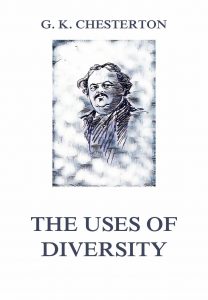
The Uses of Diversity
Format: Paperback
The Uses of Diversity.
ISBN: 9783849677626.
Available at amazon.com and other venues.
Biography of Gilbert Keith Chesterton (from Wikipedia):
Gilbert Keith Chesterton, KC*SG (29 May 1874 – 14 June 1936), better known as G. K. Chesterton, was an English writer, poet, philosopher, dramatist, journalist, orator, lay theologian, biographer, and … Read more.../Mehr lesen ...
Veröffentlicht unter Chesterton, G. K., Classics of Fiction (English)
Schreib einen Kommentar
The Superstition of Divorce
The Superstition of Divorce – Gilbert Keith Chesterton
In this collection of papers the author, in his characteristically discursive fashion, gives his impressions of the Irish character as an almost paradoxical combination of visionary dreamer and practical peasant. He emphasizes the fundamental differences between the English and the Irish out of which arise many if not all the tragic mistakes made on both sides.
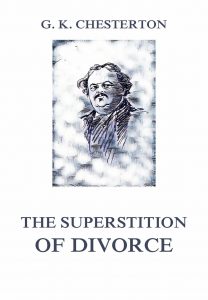
The Superstition of Divorce
Format: Paperback
The Superstition of Divorce.
ISBN: 9783849677619.
Available at amazon.com and other venues.
Biography of Gilbert Keith Chesterton (from Wikipedia):
Gilbert Keith Chesterton, KC*SG (29 May 1874 – 14 June 1936), better known as G. K. Chesterton, was an English writer, poet, philosopher, dramatist, journalist, orator, lay theologian, biographer, and … Read more.../Mehr lesen ...
Veröffentlicht unter Chesterton, G. K., Classics of Fiction (English)
Schreib einen Kommentar
Irish Impressions
Irish Impressions – Gilbert Keith Chesterton
In this collection of papers the author, in his characteristically discursive fashion, gives his impressions of the Irish character as an almost paradoxical combination of visionary dreamer and practical peasant. He emphasizes the fundamental differences between the English and the Irish out of which arise many if not all the tragic mistakes made on both sides.
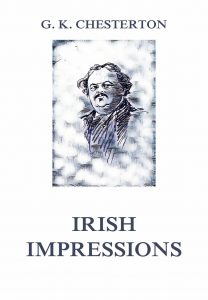
Irish Impressions
Format: Paperback
Irish Impressions.
ISBN: 9783849677527.
Available at amazon.com and other venues.
Biography of Gilbert Keith Chesterton (from Wikipedia):
Gilbert Keith Chesterton, KC*SG (29 May 1874 – 14 June 1936), better known as G. K. Chesterton, was an English writer, poet, philosopher, dramatist, journalist, orator, lay theologian, biographer, and literary and art critic. Chesterton is … Read more.../Mehr lesen ...
Veröffentlicht unter Chesterton, G. K., Classics of Fiction (English)
Schreib einen Kommentar
A Short History of England
A Short History of England – Gilbert Keith Chesterton
Chesterton, in his unimitable way, remarks that “the only way to write a popular history is to write it backwards.” This is somewhat the method he employs in his book, “A Short History of England,” in which he aims to show the importance of the populace in history, an importance that is wholly neglected by historians. England, he asserts, was created, not so much by the death of the ancient Roman civilization, as “by its escape from death, or by its refusal to die.” For four hundred years Britain was wholly Roman in its civilization. Medizeval civilization arose out of the “resistance to the naked barbarians from the North, and the … Read more.../Mehr lesen ...
Veröffentlicht unter Chesterton, G. K., Classics of Fiction (English), European History (English)
Schreib einen Kommentar
Utopia of Usurers
Utopia of Usurers – Gilbert Keith Chesterton
Characteristically brilliant and daring essays on sociological subjects in which is depicted the Utopia of the hard-headed business man, capitalists, and the millionaires who will arrange their own paradise and deal with art, religion, science, etc.
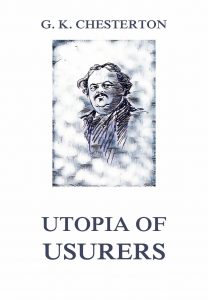
Utopia of Usurers
Format: Paperback
Utopia of Usurers.
ISBN: 9783849677503.
Available at amazon.com and other venues.
Biography of Gilbert Keith Chesterton (from Wikipedia):
Gilbert Keith Chesterton, KC*SG (29 May 1874 – 14 June 1936), better known as G. K. Chesterton, was an English writer, poet, philosopher, dramatist, journalist, orator, lay theologian, biographer, and literary and art critic. Chesterton is often referred to as the “prince of paradox”. Time magazine has observed of his writing style: “Whenever … Read more.../Mehr lesen ...
Veröffentlicht unter Chesterton, G. K., Classics of Fiction (English)
Schreib einen Kommentar
The Book of Job
The Book of Job – Gilbert Keith Chesterton
The Book of Job is among the other Old Testament Books both a philosophical riddle and a historical riddle. Controversy has long raged about which parts of this epic belong to its original scheme and which are interpolations of considerably later date. The doctors disagree, as it is the business of doctors to do; but upon the whole the trend of investigation has always been in the direction of maintaining that the parts interpolated, if any, were the prose prologue and epilogue and possibly the speech of the young man who comes in with an apology at the end. This work contains Chesterton’s assumptions and thoughts on this mysterious scripture.
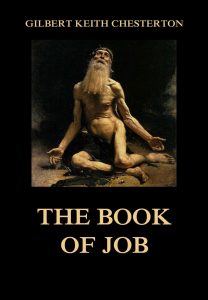
The Book
Veröffentlicht unter Biblical Studies & Commentaries, Chesterton, G. K., Classics of Fiction (English)
Schreib einen Kommentar
